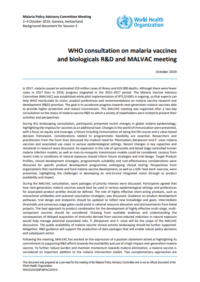WHO consultation on malaria vaccines and biologicals R&D and MALVAC meeting
Published: 02/10/2019
WHO consultation on malaria vaccines and biologicals R&D and MALVAC meeting
In 2017, malaria caused an estimated 219 million cases of illness and 435 000 deaths. Although there were fewer cases in 2017 than in 2010, progress stagnated in the 2015–2017 period. The Malaria Vaccine Advisory Committee (MALVAC) was established while pilot implementation of RTS,S/AS01 is ongoing, so that experts can help WHO rearticulate its vision, product preferences and recommendations on malaria vaccine research and development (R&D) priorities. The goal is to accelerate progress towards next-generation malaria vaccines able to provide higher protection and reduce transmission. This MALVAC meeting was organized after a two-day consultation on the status of malaria vaccine R&D to which a variety of stakeholders were invited to present their activities and perspectives. During this landscaping consultation, participants presented recent changes in global malaria epidemiology, highlighting the impetus for vaccines as an additional tool. Changes in the world of immunization were presented, with a focus on equity and coverage, a future including immunization all along the life course and a value-based decision framework. Considerations related to programmatic feasibility are essential. Researchers and practitioners from the front lines discussed the medical need for Plasmodium falciparum and P. vivax malaria vaccines and associated use cases in various epidemiological settings. Recent changes in key capacities and standards in research were discussed. An expansion in the role of sporozoite and blood stage controlled human malaria infection models, as well as man-to-mosquito transmission models could be considered. Lessons from recent trials in conditions of natural exposure should inform future strategies and trial design. Target Product Profiles, clinical development strategies, programmatic suitability and cost-effectiveness considerations were discussed for specific product development programmes undergoing clinical testing. Perspectives from organizations that coordinate and fund malaria vaccine development, as well as a GSK ‘look back’ exercise, were presented, highlighting the challenges in developing an end-to-end integrated vision through to product availability and impact.
THEMES: Enabling Technologies & Assays | Vaccines



